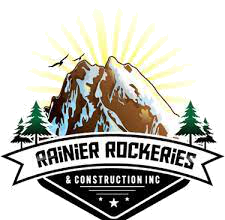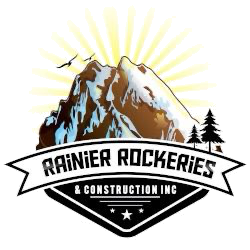If you live in the Seattle area, you know the challenge of heavy rainfall, soggy soil, and stormwater runoff. Whether you’re planning a driveway, patio, or walkway, it’s worth considering permeable pavers—a smart, sustainable option for hardscaping that works with the Pacific Northwest’s wet climate, not against it.
At Rainier Rockeries, we help homeowners create outdoor spaces that are both functional and environmentally responsible. Here’s how permeable pavers check all the boxes for eco-friendly, low-maintenance, and water-wise landscaping.
What Are Permeable Pavers?
Unlike traditional pavers or concrete slabs, permeable pavers are designed to let water pass through them or between them. Instead of sending rainwater rushing into the street (or pooling in your yard), they allow water to soak into the ground naturally.
How They Work:
- Pavers are installed with small gaps between them.
- Beneath the surface is a base of open-graded gravel that allows water to flow through and filter downward.
- Excess water drains into the soil or to a French drain system.
Why Seattle Homes Need Better Drainage
Seattle gets over 150 rainy days per year, and all that water needs somewhere to go. In older neighborhoods or newer developments without good drainage, runoff becomes a major issue.
Common problems we see:
- Flooding around patios or walkways
- Driveway puddles or erosion
- Water flowing toward foundations or basements
- Slippery surfaces and moss growth
Permeable pavers are a built-in drainage solution that can reduce or eliminate these issues while protecting your yard and your home.
Environmental Benefits of Permeable Pavers
1. Stormwater Management
Permeable pavers help slow and filter rainwater before it enters the storm system. This reduces:
- Street flooding
- Combined sewer overflows (CSOs)
- Water pollution in local streams and Puget Sound
Many Seattle municipalities now encourage or require permeable materials to help reduce pressure on outdated drainage systems.
2. Groundwater Recharge
Instead of directing water into storm drains, permeable pavers let it soak into the soil, replenishing local groundwater and reducing erosion.
3. Eco-Friendly Materials
We work with vendors like Belgard, Basalite, and Mutual Materials, many of whom offer:
- Recycled or sustainably sourced materials
- LEED-compliant products
- Options that reflect heat and reduce urban heat islands
4. Reduced Chemical Use
Since permeable pavers help prevent water pooling, there’s less chance of moss growth or slippery surfaces. That means:
- No need for harsh herbicides
- No constant pressure washing
- Less maintenance, less runoff pollution
Practical Benefits: Low-Maintenance & Durable
Permeable pavers aren’t just good for the planet—they’re great for homeowners, too.
Long-Term Perks:
- Low maintenance: No sealing or staining required
- Easy to clean: Debris can be swept or rinsed off
- Stain-resistant: Oil and leaf stains won’t soak in
- Long lifespan: Most pavers last 20–30 years
- Modular repair: If a paver gets damaged, just replace the one
Bonus for Hilly Lots:
If your property has a slope, permeable pavers reduce runoff and erosion better than smooth concrete.
Best Uses for Permeable Pavers in Seattle
- Driveways – Eliminate puddles and improve curb appeal
- Walkways – Safer, non-slip paths even in winter
- Patios – Functional and beautiful spaces for entertaining
- Courtyards or side yards – Keep smaller spaces clean and dry
- Parking areas – Stay within zoning or impervious surface limits
We can also blend permeable pavers with retaining walls, turf, or river rock for a cohesive and functional landscape design.
Common Misconceptions About Permeable Pavers
“Won’t they clog up?”
Not if installed correctly. Our crew uses layers of clean, angular gravel and recommends occasional vacuum sweeping (every few years) to maintain infiltration.
“Are they slippery when wet?”
No. Most permeable pavers are textured for traction, making them safer than sealed concrete in wet or icy conditions.
“Do they cost more?”
They may cost slightly more upfront than standard pavers but save money long-term in drainage infrastructure, water management, and maintenance.
FAQs
How much do permeable pavers cost in Seattle?
Installed prices typically range from $18–$30 per square foot, depending on the size, prep work, and material choice. Rainier Rockeries offers custom estimates and designs to fit your budget.
Are there any rebates or incentives?
Some Seattle-area jurisdictions (like Bellevue or King County) may offer stormwater fee reductions or incentives for using permeable materials. Ask us—Rainier Rockeries stays updated on local programs.
Can permeable pavers handle cars or heavy traffic?
Yes. Permeable pavers are engineered for structural integrity and can support vehicles, RVs, or delivery trucks—perfect for Seattle driveways.
Why Work with Rainier Rockeries?
We’ve installed dozens of drainage-first hardscape systems across King and Pierce Counties, including:
- Maple Valley
- Renton
- Sammamish
- Kent
- Bonney Lake
- Puyallup
When you work with Rainier Rockeries, you get:
- Owner-led oversight on every project
- In-house heavy equipment for faster installs
- Drainage-first designs that prevent future problems
- Precision workmanship and clear communication
Ready to Build Smarter?
Permeable pavers aren’t just a trend—they’re the future of outdoor spaces in the Seattle area. Let’s build you a surface that drains better, lasts longer, and looks amazing.
📞 Call (425)*******95
💬 Request a free consultation

